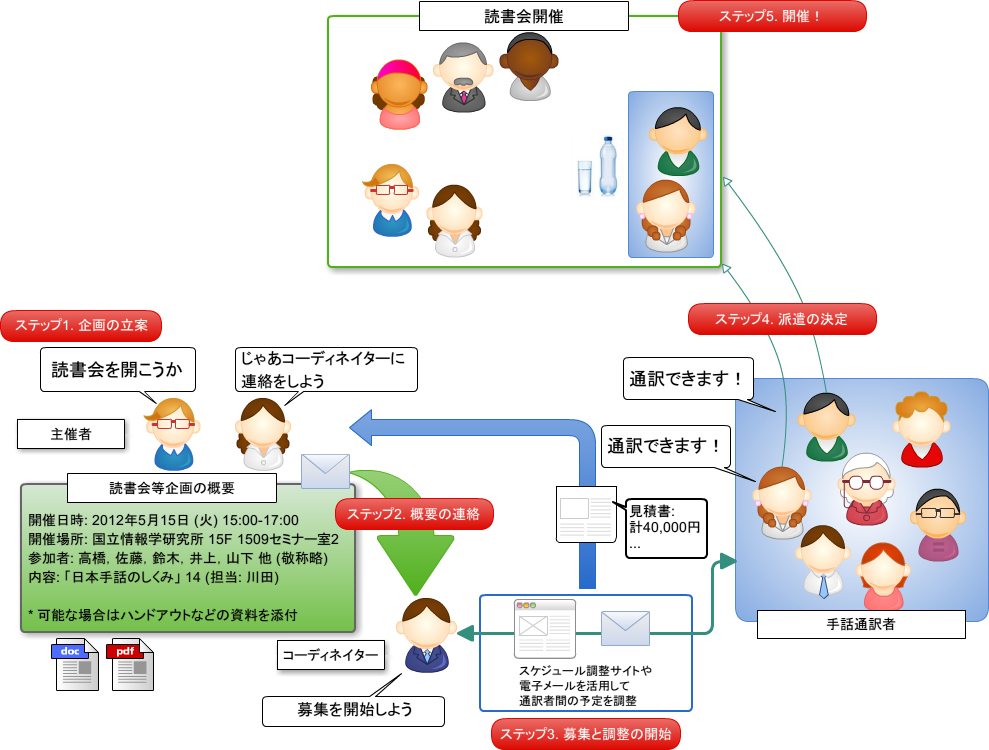- HOME
- About Lab.
- Themes
- Themes
Academic Term Translation into Japanese Sign Language
In our research activities, it is necessary to have our technical terms translated into Japanese Sign Language. What is Academic Term Translation? Where can we ask the translation service? Here, we share our experience of translating academic terms into Japanese Sign Language.
How do we order a sign language interpreter?
Step 1: Planning an event
Plan and schedule an event! It’s not just about a date and a venue. It’s also important to decide whether you need equipment such as telecommunication tools at the event.
Step 2: Contacting a coordinator
An event organizer first contacts a coordinator with the detailed schedule of the event. This schedule includes the event date(s), the number of Deaf participants, and other necessary information such as whether you use a telecommunication system. If this is an academic event such as a study group, it is important to describe the content of research articles and presentations in detail that are going to be talked about at the event. If there is any, sharing handouts and other related materials is always helpful. Particularly in academic events specific knowledge is require so that it is critical to prepare everything ahead.
Step 3: Recruiting interpreters
In Step 3, the coordinator use mailing lists and related websites in order to recruit interpreters and manage their schedules. Recruited interpreters decide where they accept the offer or not as they view the detailed information of the event posted on the website or mailing lists.
Step 4: Getting back to the event organizer
In Step 4, the coordinator gets back to the event organizer with interpreters’ contacts and an estimate based on the event conditions and the interpreters’ experience.
Step 5: The event day
Finally the event day comes. Prepare enough water bottles for the interpreters.
Other tips:
There are some job placement agencies for sign language interpreters. In our lab, we hire a coordinator and have him organize academic events for Deaf participants. If you would like to know more about this, please email use at jsl-coordinator [at] nii.ac.jp. (Change [at] to @).
Related Projects
- JST Sakigake: “Information for All: The Construction of Coordinated Environments for Deaf and Hearing”
- Digital communication technologies provide Deaf people with great changes in their lives. Pagers, text messages on cell phone enable them to communicate outside their homes. This is a drastic change from days when they had to wait for a fax at home. In the future, it is expected that developments of visually enhanced communication technologies increase more opportunities for Deaf people to participate in society. This research project seeks to offer a guideline to establish an integrated environment for both Deaf and hearing people to communicate through visual communication technologies. HP: http://www.human.jst.go.jp/
- Building database of academic language for sign language
- JSPS, Grants-in-Aid for Scientific Research, Young Scholar Category (B 2011) (Research topic number: 23700135) PI: Kohei Kikuchi
- The goal of this project is to collect various types of academic language and technical terms used in professional meetings, study groups, conferences, and workshops. As there is not shared ways of translating Japanese technical terms into Japanese Sign Language, interpreters use various kinds of terms depending on the situation. This project creates a database to appropriately translate various technical terms in sign language. Additionally as we make our database available to the public, we hope to create a better guideline for interpreters to use in translating Japanese into Japanese Sign Language at academic meetings. (See more at JSPS database).

